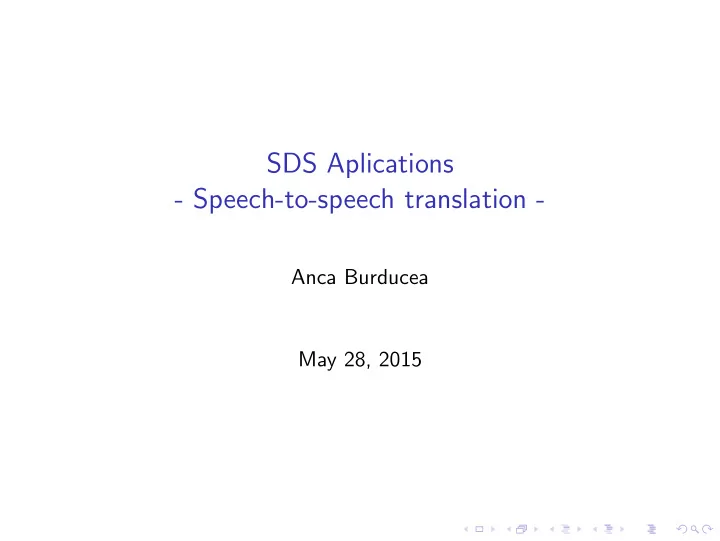

SDS Aplications - Speech-to-speech translation - Anca Burducea May 28, 2015
S2S Translation Three independent tasks: S s → T s → T t → S t S s = speech source T s = text source T t = text target S t = speech target
S2S Translation S s → T s = ASR ↓ T s → T t = MT T t → S t = TTS Wo ist das n¨ achste Hotel? S s = speech source ↓ T s = text source T t = text target Where is the nearest hotel? S t = speech target ↓
S2S Translation S s → T s = ASR – WER ↓ T s → T t = MT – BLEU T t → S t = TTS – subjective Wo ist das n¨ achste Hotel? listening tests ↓ S s = speech source T s = text source Where is the nearest hotel? T t = text target S t = speech target ↓
S2S Translation - Issues ◮ error propagation ◮ not using context in the downstream process
Annotations of Speech A lot of context annotation on speech ◮ dialog act (DA) tags ◮ semantic annotation ◮ pitch prominence ◮ emphasis ◮ contrast ◮ emotion ◮ speaker segmentation
Sridhar 2013 Enrich S2S translations using contextual information!
Sridhar 2013 Enrich S2S translations using contextual information! ◮ DA tags ◮ prosodic word prominence
Sridhar 2013 Enrich S2S translations using contextual information! ◮ DA tags ◮ prosodic word prominence Purpose: ◮ resolve ambiguities ◮ wir haben noch → we still have ◮ wir haben noch → we have another
Sridhar 2013 Enrich S2S translations using contextual information! ◮ DA tags ◮ prosodic word prominence Purpose: ◮ resolve ambiguities ◮ wir haben noch → we still have ◮ wir haben noch → we have another ◮ enrich target speech with prosody (intonation, emotion) from source speech
Sridhar 2013 S s = speech source T s = text source T t = text target S t = speech target L s = enriched source = text source + context labels L t = enriched target = text target + context labels
Sridhar 2013 S s = speech source T s = text source T t = text target S t = speech target L s = enriched source = text source + context labels L t = enriched target = text target + context labels
Sridhar 2013 Data ◮ train MaxEnt classifier for ◮ DA tagging: statement, acknowledgment, abandoned, agreement, question, appreciation, other – 82.9% ◮ prosodic prominence: accent, no-accent – 78.5%
Sridhar 2013 Data ◮ train MaxEnt classifier for ◮ DA tagging: statement, acknowledgment, abandoned, agreement, question, appreciation, other – 82.9% ◮ prosodic prominence: accent, no-accent – 78.5% ◮ tested on three parallel corpora: Farsi-English, Japanese-English, Chinese-English
Sridhar 2013 Improve translation model using source language enrichment: ◮ bag-of-words model ◮ ◮ reorder words according to target language model
Sridhar 2013 Improve translation model using source language enrichment: ◮ bag-of-words model ◮ ◮ reorder words according to target language model Improve translation model using target language enrichment ◮ factored model: word is translated into (word, pitch accent)
Sridhar 2013 - Results DA tags ◮ question(YN, WH, open), acknowledgement → significant improvement ◮ statement → no significant improvement
Sridhar 2013 - Results DA tags ◮ question(YN, WH, open), acknowledgement → significant improvement ◮ statement → no significant improvement Prosody ◮ improved prosodic accuracy of target speech ◮ lexical selection accuracy no affected (same BLEU)
Sridhar 2013 - Results DA tags ◮ question(YN, WH, open), acknowledgement → significant improvement ◮ statement → no significant improvement Prosody ◮ improved prosodic accuracy of target speech ◮ lexical selection accuracy no affected (same BLEU) Conclusion: ”the real benefits of such a scheme would be manifested through human evaluations. We are currently working on conducting subjective evaluations.”
VERBMOBIL ◮ German S2S system developed between 1993-2000 ◮ ”verbal communication with foreign interlocutors in mobile situations” ◮ ”Verbmobil is the first speech-only dialog translation system” ◮ bidirectional translations for German, English, Japanese ◮ business-oriented domains: 1. appointment scheduling 2. travel planning 3. remote PC maintenance
VERBMOBIL features ◮ context-sensitive translations e.g. GER nachste → ENG next (train) or nearest (hotel) ◮ prosody e.g. ”wir haben noch” vs. ”wir haben noch ” ◮ domain knowlege: it knows ”things about the topic being discussed” ◮ dialog memory: it knows ”things that were communicated earlier” ◮ disfluencies management: 1. filters out simple disfluencies (”ahh”, ”umm”) 2. remove reparandum
VERBMOBIL - Disambiguation
VERBMOBIL - Control Panel Demo: Link
Recommend
More recommend